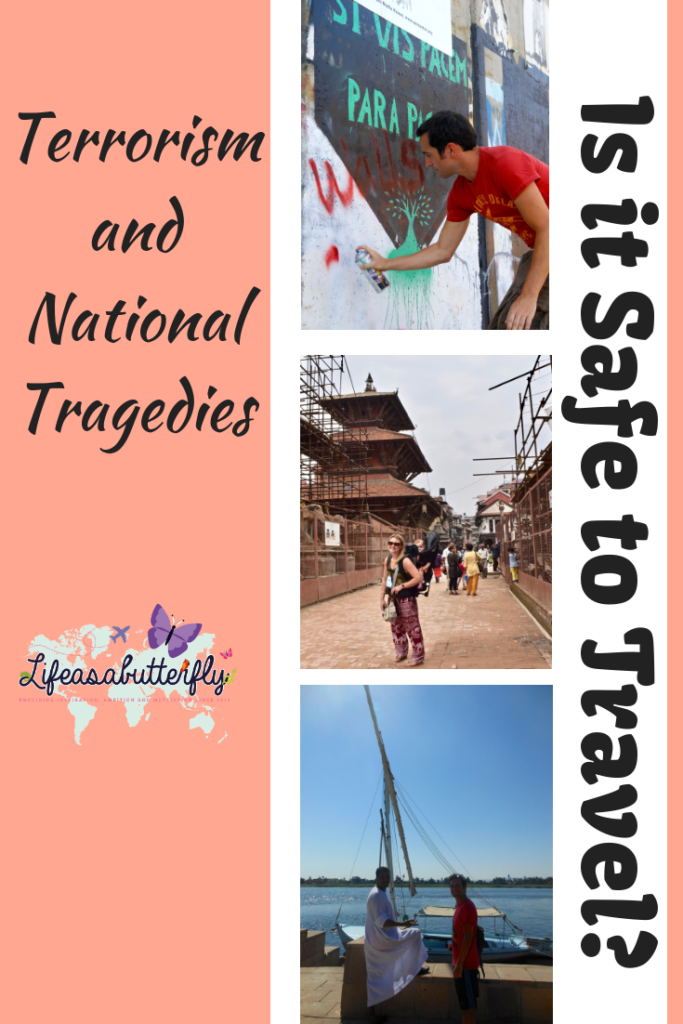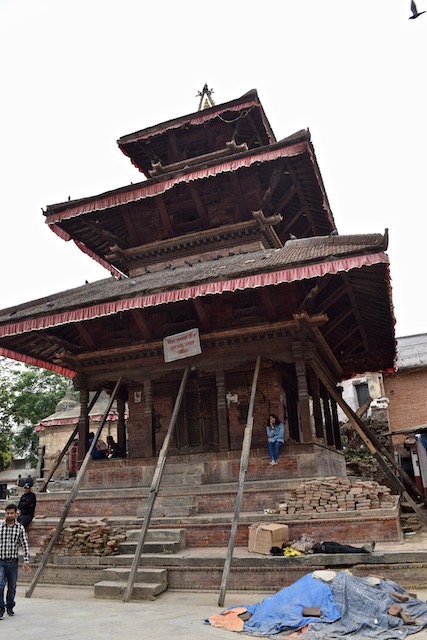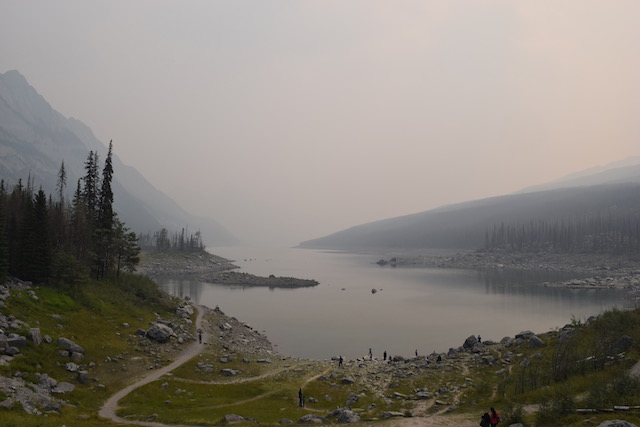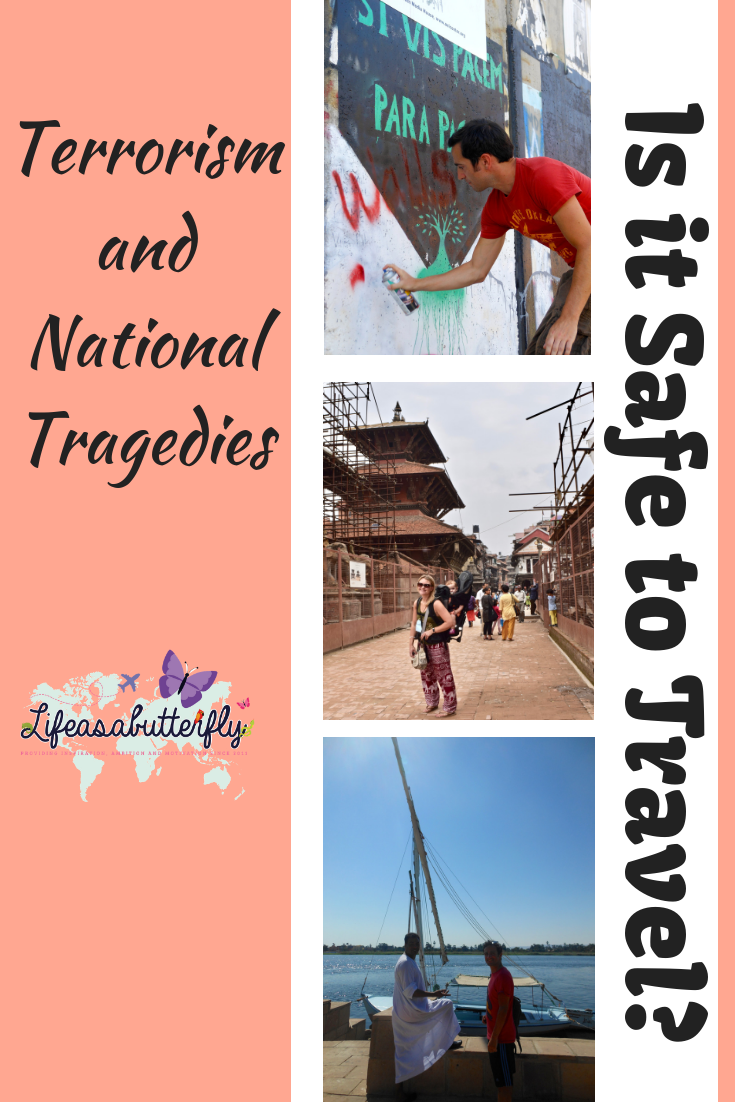For some, terrorism and national tragedies in a destination will put them off visiting. For others, this is the deciding factor, convincing them to go!
Whilst terrorism and national tragedies are, of course, unfortunate at best, such eventualities can result in reduced costs for consumers (because destinations often become desperate for business due to significant declines), which can add some appeal to visiting a destination that has recently suffered terrorism or a national tragedy. I have done this with my travels through Egypt after the revolution and Israel during the war with Palestine, where I travelled for bargain rates.

Terrorism and National Tragedies – Is it Safe to Travel?/h2>
After an unfortunate even such as terrorism or a national tragedy, many tourists with pre-booked trips will find themselves asking if it is still safe to go. Whilst, this is, of course, a personal decision. Here are some things for you to consider.
Is the event likely to happen again during your trip?
Last year Mexico, named as one of the top 10 holiday destinations, was hit by two earthquakes just weeks apart, causing exponential infrastructural damage and the loss of over 360 lives. Although the chances of this happening again during your trip are relatively low, it is difficult to ignore the ever-present risk of something unpredictable happening.
If the risk of earthquakes makes you nervous, perhaps consider Europe instead. Europe is generally regarded as a safe zone from earthquakes as there are no major fault lines.
Last yearI visited Kathmandu with my 14 month old baby girl, three years after the 2015 earthquake hit. I was not concerned about it happening again during our trip, because this was very unlikely. However, it was somewhat disturbing to see the destruction caused and how the effects were still so severe, even after so much time had passed. Many o the major tourist attractions were destroyed, piles of rubble still lay on the ground and almost every local we spoke to mentioned the tragedy. It was very sad to see.

Is this a common event?
In the summer, Greece suffered terrible wildfires which killed over 70 people and resulted in the complete destruction of a tourist resort. Whilst Greece does not have national tragedies like this every year, there are places which do.
During mytravels around Canada, for example, I saw devastating wild fires that had wiped out vegetation and buildings for miles upon miles. This is a common occurrence and so tourists are pretty well informed about the risks (if they take the time to research it).

Another good example is hurricanes in the Caribbean region. These happen pretty much every year around the same time (June-November), although to varying degrees. This is why holidays are generally cheaper at this time.
If you know that the national disaster happens time and time again, then perhaps reconsider your travel choices, or at least make sure that you have.
Does the event pose a risk to tourists?
Holidaymakers are being put off locations perceived to have a high terrorism risk. In a survey carried out by Silver Travel Advisor, 63% of respondents said that they would not take a holiday where there have been terrorist attacks.
It is true, however, that memories are short-lived and any adverse effect on visitor numbers do not usually last.
Take ABTA’s Holiday Trends Report in 2018, for example, which found that destinations like Turkey, Egypt and Tunisia were significantly up on bookings this summer, despite Tunisia having suffered a lone terrorist attack that killed 38 people, including 30 British tourists, at the Riu Imperial Marhaba Hotel just three years ago.
Other people might be put off by ongoing factors such as high crime rates or violence in the country. Guatemala is a good example of this. These concerns, however, are often over-rated as tour operators want to protect themselves for any eventuality and the media portrays what we think is interesting, which is not always the full story!
Is the problem ongoing?
Some people claim that many of the natural disasters that we see nowadays are down to climate change, an ongoing and unpredictable phenomenon.
If climate change is likely to be the cause of more frequent weather extremes , then finding a holiday destination immune to wildfires, flash flooding and severe storms, may not quite as easy as you might think. Even in destinations previously viewed as ‘immune' to such natural disasters have suffered in recent years, such as Majorca, where a British couple lost their lives as torrential rain caused flash flooding which engulfed the town of Sant Lorenç last year.
But despite everything, the British appetite for holiday abroad seems set to increase. The percentage of people taking a foreign holiday this year increased to 60%, the highest level since 2011 according to ABTA’s Holiday Trends Report. Not all destinations are equal though.
Are there safety measures in place?
For me, the most important factor is whether the destination is safe to travel to or not. OK, so the earthquake run Nepal had long passed and the risk of another was small, however the earthquake had a number of ripple effects ranging from boarders being closed and therefore lack of supplies of food, water and medicine, to falling debris and unsafe buildings, to spread of disease.
Some of the countries that are most affected by natural disasters and which rely most heavily on tourism are also some of the most impoverished and may struggle to put the right planning, safety and security measures in place that tourists need.
After a tsunami hit Sulawesi in September, for example, Indonesia’s national disaster agency admitted that their 22 deep water buoys used to detect tsunamis had not been operational since 2012. It is suspected that this is due to a lack of government coordination and funding.
Despite the risks associated with travelling to places prone to natural disasters and terrorist attacks, the number of Brits travelling to Indonesia has almost doubled since 2010, with 360,000 British nationals visiting Indonesian islands last year. Tourists can help to protect themselves when travelling by identifying types of disasters that have the potential to occur in the area they are visiting and taking steps to prepare themselves for these. This could include, for example, having protective clothing such as an adult and a child respirator mask, sturdy boots and goggles if travelling to an area prone to wildfires, and ensuring they have a disaster kit containing important documents, cash, food and water and first aid kit close to hand.
What's more, sectors connected to the travel industry, such as insurance, recognise that there is still a thirst for travel and are therefore adapting their products to ensure that they offer a wide choice of covers to enable travellers to protect themselves against crisis’ and disasters.
Travel insurance is something that I would never travel without, all you need to do is Google it to find lots of examples of the consequences of tourists falling ill or being involved in terrorism or a national tragedy when they do not have adequate insurance.
There are many companies and policies available for your specific needs. For example, Insure4Retirement, offer a Crisis Response Service with their Ready2Go Gold travel policy. A key benefit of this cover is a dedicated phone number which gives travellers access to immediate assistance and an unrivalled set of skills if disaster strikes while they are abroad.
The service is provided by S-RM who has a team of crisis response consultants made up of former military, law enforcement and intelligence agency personnel, strategically positioned around the world to provide assistance during a crisis. Having cover such as this in place is important in case of emergency, but otherwise it is great just for putting your mind at ease, knowing that you're covered ‘just in case'. This was something I looked into in depth prior to climbing Mount Kilimanjaro last year where an average of ten tourists die every year
As I discuss in some of my academic posts, tourism is a resilient industry, but many many destinations are over-reliant on the business that they receive from it. There will always be a reduction in visitor numbers following terrorism and national tragedies, but the travel industry knows that the desire to travel will always outweigh the risks.
I'd love to hear about your experiences- does terrorism and national tragedies put you off travel or spark your interest due to lower travel costs? Have you visited anywhere during an event such as this? What were your experiences? Leave your comments below!




[…] One of the best things about travelling with charter airline is that you have additional financial security if the flight is booked as part of a package holiday. Package holidays are covered by ABTA and ATOL regulations (you can read more about how this works here)https://www.caa.co.uk/ATOL-protection/Consumers/About-ATOL/. Whilst these cover many things, one of the most noteworthy aspects to travellers is that they will cover the costs if your holiday company or airline goes bust or if there is some type of disaster, terrorist incident etc. […]
[…] In these cases you might be able to find yourself a good bargain. Be sure to check that it is still safe to visit first […]